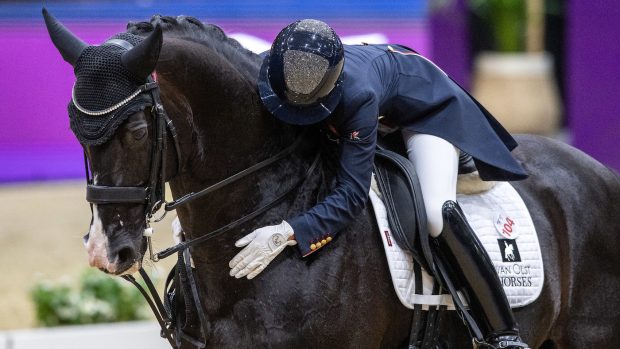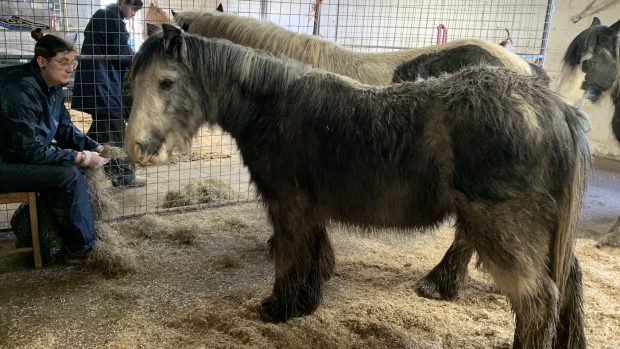Two more horses have died as a result of the equine herpes (EHV-1) outbreak in Europe, while one in isolation has tested positive in Doha.
In the latest update on the situation, the FEI said today (3 March) that although the situation in Valencia is still “extremely distressing for athletes and owners”, it has improved.
“A total of 83 on-venue horses are showing clinical signs and are being treated, but none of these horses are recumbent and require slings for support,” the FEI statement said, adding that 15 horses are being treated in external clinics, 13 in Valencia and two in Barcelona.
“There have been no more equine fatalities at the venue in Valencia since last weekend, but sadly one horse has died at a veterinary hospital in Barcelona and one has died in Germany. Both of these horses had been in Valencia.
“There are no reports of any further related deaths, but tragically this brings the total number of deaths in this outbreak to six.”
The FEI said its veterinary manager Gonçalo Paixão remains in Valencia, and will be joined by jumping director Marco Fuste, who will support the onsite team.
“Communications have also improved, with a meeting at the venue today between Spanish ministry officials (MAPA), the organisers, the organising committee veterinarians, an athlete representative and the FEI treatment team leader,” the statement said, adding that agreement has been reached on roles, treatment protocols and a new plan for separation of horses following “requests from athletes and owners for their horses to be grouped together without infringing biosecurity protocols”.
Additional temporary stabling is due to arrive in Valencia tomorrow.
In Doha, where the Global Champions Tour event is due to start tomorrow, a German horse has tested positive for the virus. It had already been in isolation since it had arrived from Valencia, and has been transferred to isolation facilities at a veterinary clinic, along with another German horse whose test result was inconclusive.
“A total of four horses that had been competing in Valencia arrived in Doha on 20 February, having left the Spanish venue earlier in the month,” the FEI statement said. “Of the four, two Colombian horses had left Valencia on 7 February, and the two German horses on 12 February, eight days prior to the FEI being notified of the EHV-1 outbreak.
“As per our communique of 22 February, the FEI identified all 752 horses that had been in Valencia since 1 February and blocked them in the FEI database, meaning that they cannot enter any FEI events until they have fulfilled the necessary testing requirements. This included the four horses that had travelled to Doha and the FEI contacted the organisers to tell them to isolate these horses on the Al Shaqab venue. All four horses tested negative on 22 February, but remained in the isolation stables.
“The FEI has been in contact with the Doha organisers continuously and has conducted an ongoing risk analysis of the situation, together with world-leading epidemiologists. Based on the additional biosecurity measures already in place onsite at Al Shaqab, the fact that all other horses at the venue have returned negative PCR tests over the last two days and subject to a number of mandatory conditions, the FEI has agreed that this weekend’s competition can go ahead in Doha. However, the FEI reserves the right to cancel the event if there are any changes to the current situation.”
The FEI and Doha organisers invited all riders onsite, officials and team vets to a virtual meeting today to discuss the conditions under which the event is allowed to run. These include equine temperature monitoring and recording, isolation for the four horses mentioned above, social distancing measures for horses and daily communication with the FEI.
“Obviously there is no such thing as zero risk, but for the competing horses in Doha, there is no greater risk of infection than at any other event”, FEI veterinary director Göran Akerström said.
“Epidemiologically, the risk of further cases amongst other horses in Doha is negligible due to the biosecurity measures that have already been put in place, and the additional mandatory conditions agreed today. Obviously the situation will be monitored very closely and we have the option to cancel the event if things change.”
The Defra view
A Defra spokesman told H&H today that the department is aware of the situation in Europe.
“We are working closely with the equine sector to ensure owners are aware of the risks and are taking the necessary precautions to keep their animals safe,” he said.
Continues below…

‘The most serious outbreak in Europe for decades’: four horses die from EHV-1 as more cases confirmed
In an update today (1 March) the FEI confirmed four horses had died from the neurological form of EHV-1 in

International competition halted owing to ‘rapid evolution’ of EHV-1 outbreak
Yesterday (1 March) the FEI confirmed four horses had died in Valencia, 84 horses at the venue were showing clinical

Subscribe to Horse & Hound this spring for great savings
“There have been no reports of any related disease in the UK, but we remain vigilant to horses returning from Spain, France, Germany, Belgium and Switzerland.
“Anyone who is worried about the health or welfare of their equine should seek advice either online at the British Showjumping website or speak to their vet.”
Horse & Hound magazine, out every Thursday, is packed with all the latest news and reports, as well as interviews, specials, nostalgia, vet and training advice. Find how you can enjoy the magazine delivered to your door every week, plus options to upgrade to access our H&H Plus online service which brings you breaking news as it happens as well as other benefits.




